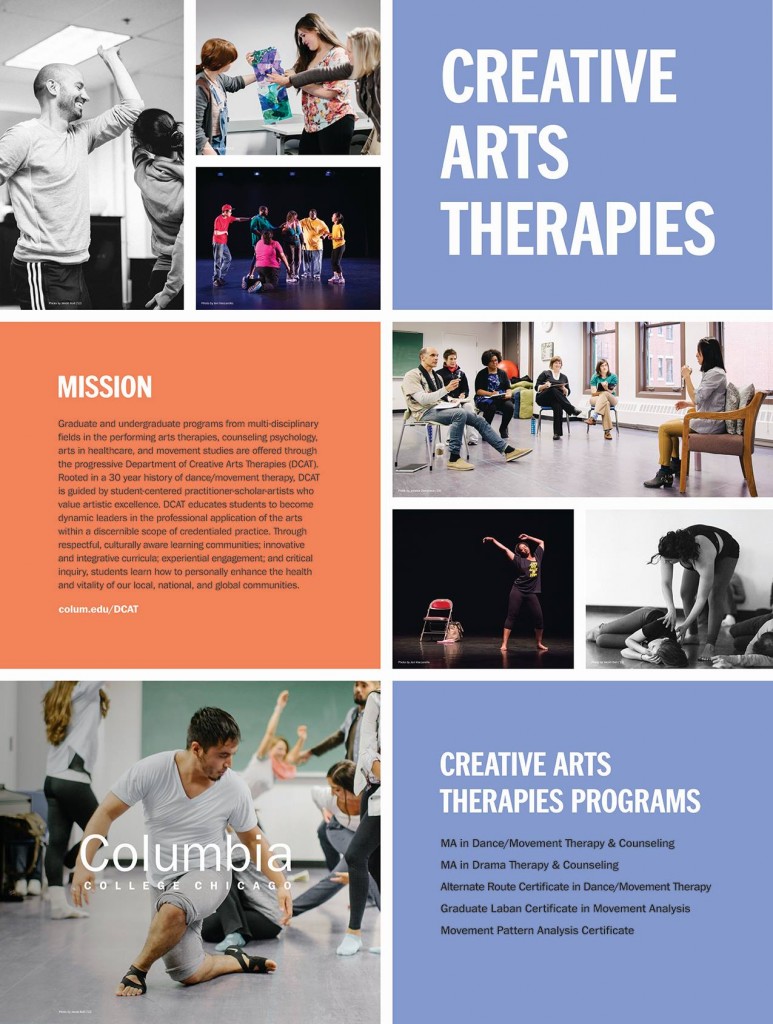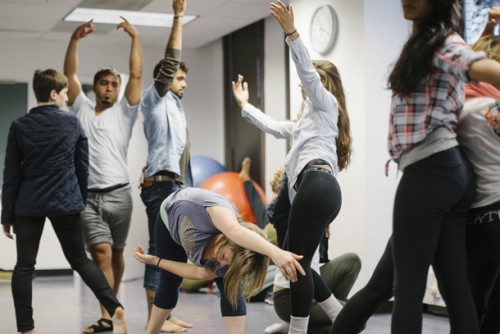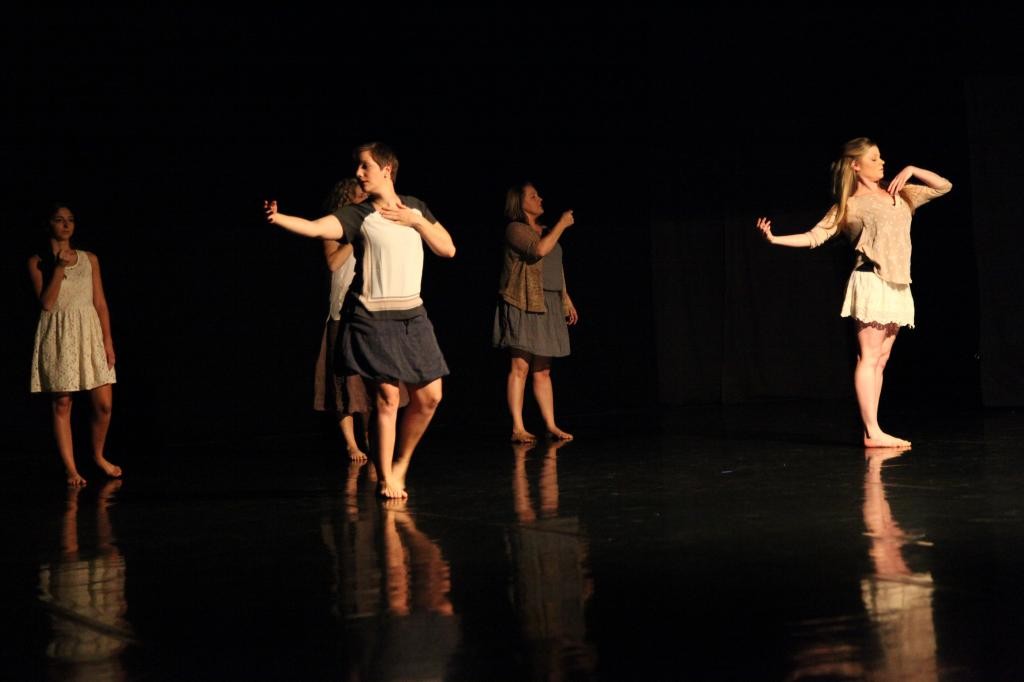
Frequently Asked Questions
With the application deadline for Columbia College Chicago’s Dance/Movement Therapy, MA program quickly approaching (December 15 for summer 2016 start) and the Graduate Reception/ Columbia’s Open House in the past, I thought it would be a good idea to write about some of the most frequently asked questions that I (as a current student) get from prospective students about the program. So let’s start :)
Why did you choose to study dance/movement therapy?
For the longest time I knew that I wanted to study psychology. I had always be curious about people, their stories, the way they think and make decisions, and I loved observing other people in their everyday life. At the same time I have also always been a mover and have been dancing since the age of 13 (which is almost late compared to most students applying for this program). I was amazed when I got to know that there is actually something called dance/movement therapy, which combined both of my passions. After looking further into it, I knew that this is what I wanted to do…it just sounded like me! And being in the program now for 1 ½ years I am so grateful that I can truly be who I am and that I do not have to compromise any aspect of my life to fit into a specific work environment. I love the work I do at my internship site, even if it is stressful at times. In addition, it was important for me to choose a career or a job, which I truly enjoy, even if that means I won’t earn a tone of money along the way.
Why did you choose Columbia College Chicago to study it?
Just as most of us, I put some effort into thinking about which university I would like to attend after deciding to become a dance/movement therapist. As a result, I visited several of the 7 universities in America that offer dance/movement therapy. I went to see what the campus is like, to meet faculty, and get some insight into their teaching approaches. From all my experiences, Columbia College and Chicago just seemed “right”. I loved the campus, the parks right across the street, and the lake just a 5 minute walk away. I liked the diversity of the campus and the way all students were encouraged to express themselves, because Columbia College is a media and arts school. I liked the diversity of faculty and staff and the way they approached new applicants and prospective students. When I visited Sarah Lawrence, Pratt, Lesley and Drexel I just did not have the same feeling. Furthermore, Columbia’s DMT&C program follows a humanist-extentialism approach, which aligns really well with my own worldview. Pratt, in my understanding, is more psychodynamic oriented and Naropa has a strong spiritual influence. I think those are great but it did not work for me. Lastly, Columbia College and this program offer the most scholarship opportunities compared to all universities offering DMT. We have (or had) 4 full scholarships (merit awards), covering the tuition fees for two years/ 60 credits, and several other departmental and university scholarships. Knowing that took some of the financial pressure of me (even if I did not receive one of the 4 merit awards). So in conclusion, I would advice all of you to go where you feel “right”. Columbia definitely felt right to me and I do not regret my choice.
What is important to know about the application movement video?
At least in my experience, the movement video is the first step for faculty and staff to assess how you are in your body and how you move in it. I don’t think it is about your technique or choreographic skills (both things I am terrible in and I made it into the program!). Of course, it should show you dancing, but I don’t think it matters if it is improvisation, a recent performance, or something that you choreograph specifically for this application. There is also no preference for a dance style, because we all have a different background. Make sure that you are feeling comfortable in the space and in the way you move. If you really enjoy dancing HipHop don’t try to force yourself into modern or ballet. Choose something you can put all your heart in. And don’t record it last minute…I did that and it was just stressful and I hated the result. Also make sure that you are identifying yourself in your video. I did this by recording a little introduction section on my computer (saying my name and the purpose of the video) and cut it together with my movement recording [thanks to iMovie]. I guess keep it simple.
If I make it through the first round, what will the movement interview look like (scheduled for Saturday, March 5, 2016)?
To be honest, I freaked out the hour before my movement interview. I was so nervous (and jetlagged) and when I saw all those other applicants I felt insecure and doubted if I actually had the potential to get into the program. However, staff and faculty did a great job to take away some of the anxiety and I loved the experience! We started off introducing ourselves and saying where we were from. After that one faculty member lead us through a movement warm up, a short modern sequence, and some crossing-the-floor exercises. I remember the crossing-the-floor exercises, because they were not like the classic ones I used to do in dance classes. Instead they put on different types of music or threw in themes to which we had to cross the floor. At least I had a lot of fun doing that. Then we formed groups improvising and creating a little piece about our experience during the movement interview. Faculty and staff joint us in that part. At the end, each applicant did an individual interview with one of the staff members – which for me was more like a loose conversation between friends about the awesomeness of dance/movement therapy – as well as writing a short reflection on the experience. For everyone who wanted to stay and learn a little bit more, a couple of then first year students took us to our department building, showed us the rooms we would have classes in, and answered all the questions we still had about studying at Columbia and living in Chicago.
Will there be performance opportunity while studying at Columbia?
YES! There are several performance opportunities throughout the year. During the Fall semesters, the department’s student organization MOVED (Master Organization Volunteering and Educating in Dance/Movement Therapy) is organizing a dance concert in which current students, faculty, staff and alumni are able to perform (actually our next concert is on November 19th and 20th in Hamlin Park!!). Right now there is a plan to organize a dance concert for each Fall and Spring semester, but it all depends on the available money and who is on the board of MOVED. In addition, we have our student/faculty concert in summer (July) and a dance concert for alumni in spring (March). MOVED also tries to organize as many performance opportunities as possible to promote the field of DMT. Usually, we are invited as guest performers. Last year we performed at the Institute for Therapy through the Art’s anniversary gala as well as for Global Alliance for Africa. Of course, all these performance opportunities are voluntary and vary from year to year, but there are several companies in Chicago, which offer paid performance opportunities. Lastly, we have an assistantship position for a first year DMT&C student to organize weekly dance classes and to inform about performance opportunities and other dance related activities throughout Chicago.
What about internships and gaining work experience?
As part of Columbia’s curriculum, you will gain practical experiences through two “internships” during your 2-year program. The first one (field placement) will be during your second summer in addition to classes and twice a week (16 hours, 200h total); the second one (internship) will be along your second year (Fall, Spring) three days a week (24 hours, 700h total). The whole setup makes the program quiet intense, because you do not have any summer break (okok, you have a 1 week break…) and the workload during your second year is just crazy. Laura Allen, our internship coordinator, will help you figuring out which population you would like to work with and which sites might be of interest to you. She will also provide you with contact information and support you in your application process. As part of the ADTA requirements, you will have to work with two different populations. For example, I did my field placement in an adult daycare service for older adults with dementia and I am now, during my internship, working on an inpatient psychiatric unit with adults. Others work with adults first and then with children or the other way around. In addition, our department has contact to over 100 potential sites, which you can choose from.
What are your plans for after graduation?
After I finish my two years of coursework and my internship, I will still have to write my master thesis, which I expect will take me another year. I also want to use that time to prepare for the state exam to become a licensed professional counselor (LPC) in the state of Illinois. The program fulfills all the prerequisites for the exam so I am eligible to take the exam after finishing the program. Of course, I am planning on handing in my certificate to the ADTA to become a registered dance/movement therapist (R-DMT). At this point I am also looking into working in an either inpatient or outpatient psychiatric facility for adults. As an international student I am not sure if I will be able to stay in the United States after graduation (visa issues and stuff). However, down the road I want to either come back or to stay long enough to take the next level of licensure and to become a board certified dance/movement therapist (BC-DMT) and a licensed clinical professional counselor (LCPC). This is possible after approximately two years of full time work and supervision. After that I would be able to go into private practice, something that I consider for maybe later in my life.
So this turned into a pretty long blog post!! If you have any other questions, please do not hesitate to contact me (dmt.ma@colum.edu). Also check out the application requirements here! Good luck to everyone who is applying this year!




